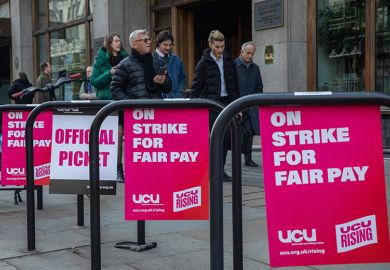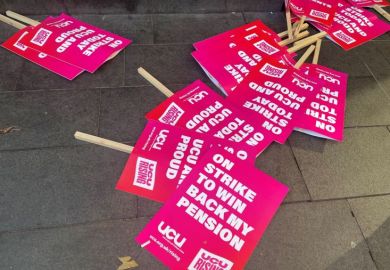Following talks on pay for the 2014-15 academic year, held yesterday, the UCU said it would postpone the boycott – due to start on 28 April – to 6 May to allow for a ballot of members.
The boycott – and a series of strikes held since October – are part of an ongoing dispute over a pay offer of 1 per cent for the current academic year.
However, although the latest offer is for the 2014-15 academic year, it is thought UCU members may be asked if it can be viewed as a way to resolve the dispute.
UCU general secretary Sally Hunt said: “Following this offer, UCU has decided to ballot members on their views. It is only right that they make the ultimate decision about what happens next.”
According to the Universities and Colleges Employers Association, which negotiates pay on behalf of higher education institutions, its “full and final pay offer” is “substantial” and exceeds the current rate of inflation as measured by the consumer price index.
The offer also includes an increase of 2.2 per cent to the lowest point on its 51-point pay scale and an offer to examine the use and usefulness of that pay point – which equated to £7.48 an hour in 2013-14.
It said the proposed increase will “bring the vast majority of staff in the sector on the lowest points of the pay scale to rates equivalent to or above the Living Wage”, which is £7.65 outside London and £8.80 within the capital.
It added that many universities already paid in excess of the Living Wage and provided generous sickness, holiday and pension benefits not included in the Living Wage calculations.
Chris Gaskell, principal of the Royal Agricultural College and a representative of Ucea’s negotiation team, said the meeting on 15 April had been “constructive”, with “both sides exploring all options and seeking realistic outcomes that can be acceptable to all”.
“The employers have made a substantial final pay offer of 2 per cent on all pay points with a commitment to discuss further the other important elements of the claim,” said Professor Gaskell.
He called on union members to “consider carefully the real value of the offer being made”.
“All in the sector share an aim to conclude this year’s negotiations successfully and draw a line under last year’s dispute,” he added.
However, the 2 per cent uplift may not be enough to placate unions, which claim a series of below-inflation offers have resulted in a 13 per cent pay cut in real terms since 2009.
Employers have claimed the current offer is “at the limits of affordability” and seeks to “reward their much valued and hard-working staff this year”, while they also say just 5 per cent of staff took part in strike action in October, with support waning in subsequent actions.
Register to continue
Why register?
- Registration is free and only takes a moment
- Once registered, you can read 3 articles a month
- Sign up for our newsletter
Subscribe
Or subscribe for unlimited access to:
- Unlimited access to news, views, insights & reviews
- Digital editions
- Digital access to THE’s university and college rankings analysis
Already registered or a current subscriber? Login




